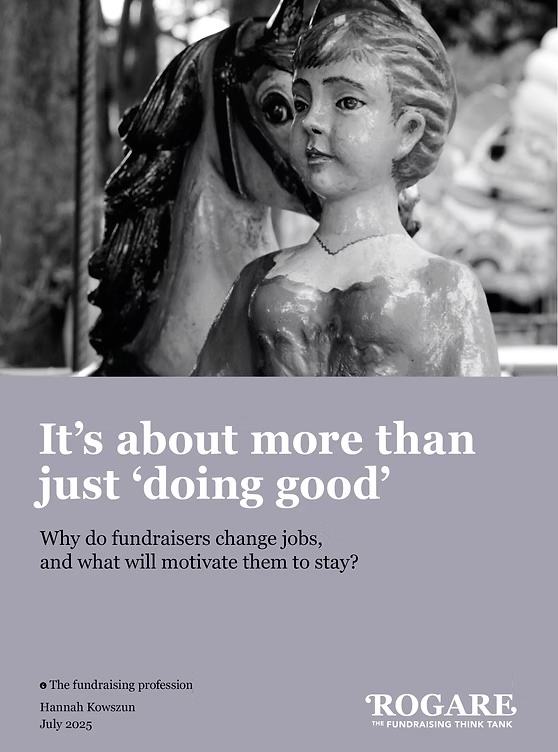- Home
- About Us
- The Team / Contact Us
- Books and Resources
- Privacy Policy
- Nonprofit Employer of Choice Award

Fundraisers need to be given more ownership of their roles and the professional autonomy to carry them out if charities are to tackle the retention crisis bedevilling the fundraising profession. But relying on fundraisers’ inherent pro-sociality—their drive to do good—is not enough to keep them in their jobs, particularly if, as some do, they simply get bored with their routine.
The recommendation is made in the latest report from the fundraising think tank Rogare – “It’s about more than just ‘doing good’: Why do fundraisers change jobs, and what will motivate them to stay?”
The report is written by fundraising consultant Hannah Kowszun (a member of Rogare’s Critical Fundraising Network), based on her Master’s dissertation in organizational psychology at Birkbeck, University of London.
Unsurprisingly, job satisfaction is correlated with intention to leave: the less someone feels satisfied in their role, the more likely they are to want to leave it. Hannah’s research shows that job satisfaction among fundraisers is generally high, but that those who are unhappy in their roles are very unhappy.
While this might appear an obvious conclusion, Hannah sought to go beyond that in her Master’s research by exploring the effect of three further questions on turnover intention:
The first two of these had no effect on a fundraisers’ intention to change jobs.
Explaining the findings, Hannah says:
“The lack of a link between being pro-socially-minded and deciding to stay in a job is, on the face of it, surprising. Why would people leave jobs and causes they care about? Pro-sociality is a major reason why people become fundraisers in the first place. However, once in the job, it’s other factors that contribute to their feelings of job satisfaction.”
By considering fundraisers’ roles using a tool called the “Job Characteristics Model”, Hannah concludes there are two key factors that contribute to fundraisers’ intention to stay in their jobs (and the absence of which cause them to want to leave):
Autonomy – the degree of freedom and independence given to them to perform their roles, which for fundraisers ought to include having a say in setting their targets.
Skill variety – how much the role requires the use of a number of different skills and talents. As one of Hannah’s research participants says, she left her job simply because she got bored.
Hannah concludes:
“While the role of fundraiser is unique in the nonprofit and commercial sectors, fundraisers are nonetheless just like members of every other profession in that they want autonomy over, and ownership of, the work they do, and to exercise a full range of skills in carrying out this work. When it comes to tackling the retention crisis in fundraising, this is what we need to consider. Yes, fundraisers will always deserve remuneration commensurate with their level of knowledge, expertise and competence. But give fundraisers more control and invest in their skills, and they are more likely to carry on delivering for their chosen charity, rather than go searching for better.”
Hannah recommends three processes that could help retain fundraisers:
Dual promotion tracks – under which promotion is decoupled from the requirement to be a manager, meaning some people are able to advance only in their competency track if people management is not their strongest suit.
Continuing professional development – that is designed to give fundraisers mastery over their craft rather than be merely competent at it.
Retention interviews – why wait until some leaves to ask them about their reasons for going? Conduct informal interviews to find out if they are happy in their jobs and if not, what can be done about it.
 The new report can be downloaded from www.rogare.net/turnover.
The new report can be downloaded from www.rogare.net/turnover.
Hannah can be reached via a LinkedIn DM. For more information about Rogare, contact Rogare’s director Ian MacQuillin, ianmacquillin@rogare.net.